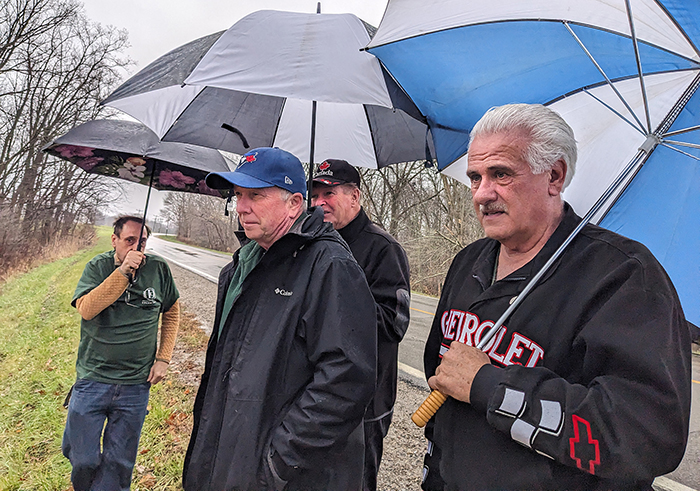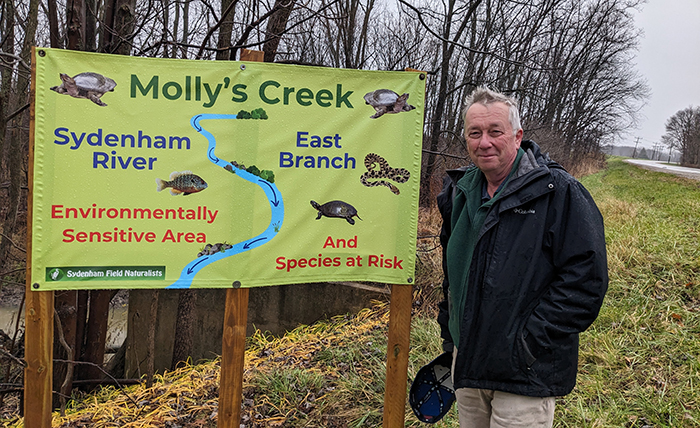
By Pam Wright
Local Journalism Initiative Reporter
An environmental assessment of the proposed Dresden dump could be anywhere from three to eight years away, but those opposed to the project continue to gear up for the fight.
To that end, two experienced lawyers from the Canadian Environmental Law Association (CELA) have joined Dresden Citizens Against Reckless Environmental Disposal (C.A.R.E.D.) in the battle.
Rick Lindgren, who helped author Ontario’s Environmental Bill of Rights in the 1990s, and CELA executive director Theresa McClenaghan made the trek to Dresden recently to get a first-hand look at what the community is trying to defend.
“It’s pretty impressive,” Lindgren told The Voice following the tour. “It’s a really well-organized group. I think they fully understand what they’re up against and they’ve done a great job getting organized, getting involved and getting informed.”
McClenaghan echoed her colleague.
“I often say we never ever win cases for our clients by ourselves,” she said. “It really takes motivated communities and we then just give a hand.”

CELA’s involvement with Dresden C.A.R.E.D. is the latest wrinkle in the quest to stop Mississauga-based York1 Environmental from expanding the dormant dump located just a kilometre north of town. If approved, the company plans on enlarging the site’s landfill capacity and will build a recycling depot and stormwater management pond system.
The community has been engaged in a vigorous nine-month fight against the project that would see hundreds of trucks transporting soil and construction waste daily to the site. The company’s proposal came to light in February when it was discovered on the Environmental Registry of Ontario by chance. In July of this year, Ontario’s Minister of Environment, Conservation and Parks ruled that an environmental assessment must be conducted regarding the development.
Lindgren and McClenaghan say the EA is good news.
“The fact that it’s been designated for an EA is really significant because there is a lot of transparency required in the process,” McClenaghan said. “It means the community’s voices will be taken seriously.”
Dresden’s landfill woes are similar to what happened near Ingersoll where Oxford People Against the Landfill Alliance (OPAL) defeated a landfill proposal in Zorra Township. The grassroots group fundraised hundreds of thousands of dollars to oppose the development.
Lindgren and McClenaghan served as counsel for OPAL, noting Dresden’s case is similar as it’s “extremely close” to a community “that’s not at all welcoming,” noting the proximity to Molly’s Creek poses a threat to the groundwater supply.
The Municipality of Chatham-Kent has also stepped up to fight the dump, despite allegations that some elected officials were aware of York1’s proposal prior to the news becoming public.
A 4,000-signature petition is also part of Dresden C.A.R.E.D.’s arsenal. The petition, which calls on the government to hold the project for a number of reasons, was read into the Ontario Legislature Dec. 5 by Hamilton West-Ancaster–Dundas MPP Sandy Shaw, opposition critic for the environment.
The petition contends that municipalities have the right to refuse a project that could negatively impact health, is located too close to the high school and elementary school, is a threat to water quality and endangered species in the Sydenham River watershed, will increase traffic congestion, and shouldn’t be allowed under Bill 197 as its less than the required 3.5 kilometres from town.
As part of the EA, Dresden’s rich history, the concerns of First Nations communities and the area’s agricultural industry will also be considered, McClenaghan said.
Dresden C.A.R.E.D. chairperson Stefan Premdas said the group is pleased to have CELA’s support and hopes the province will take note.
“We’ve given this government several options utilizing their own laws and parameters to safeguard communities, but they have chosen to ignore it and put us through the costly time-consuming environmental assessment process,” Premdas explained.
He said CELA’s commitment is a “manifestation of many, many months of hard work.
“We’re really thrilled to be able to pull back the curtains and show the community the strength of the partners that we are working with to help protect our homes,” he said.
According to Lindgren, next steps in the EA include setting out the terms of reference in a process that could take as long as eight years.
“None of that has happened yet to our knowledge,” he said. “That is something that’s initiated by the proponent and will be reviewed and/or approved or rejected by the Minister of the Environment. I’ve been involved in a lot of landfill fights across this province and they don’t happen quickly and they don’t get decided overnight.”
McClenaghan said it’s important the community continues to make their voices heard.
“Speak up, speak often,” she advised.






